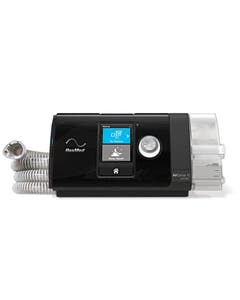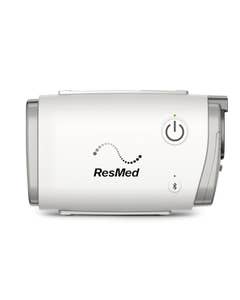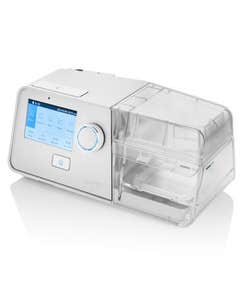Relation Between Sleep Apnea and Alzheimer’s
Sleep plays a vital role not only in our physical health, but our mental health as well. Specifically, quality sleep is important for cognitive function and long-term memory. Perhaps that is why it comes as no surprise that some research suggests a link between sleep orders such as obstructive sleep apnea and Alzheimer’s.
What is Sleep Apnea?
Obstructive sleep apnea (OSA) is a common disorder characterized by a blockage of the airway during sleep. Individuals experiencing this blockage stop breathing multiple times throughout the night, and often wake gasping or choking for air. OSA has already been linked to numerous health risks, such as cardiovascular disease, type II diabetes, and stroke.
Symptoms of sleep apnea can include:
- Snoring
- Excessive daytime fatigue
- Headaches
- Forgetfulness
- Lack of concentration
- Mood swings
What is Alzheimer’s?
Alzheimer’s Disease is a degenerative disorder in which brain cells die, resulting in confusion and memory loss. The disease is prominent in older individuals. Approximately 50 million people around the world suffer from this disease.
In addition to confusion and memory loss, common symptoms may include difficulty with numbers, mood swings, and impaired motor function.
The Connection Between Alzheimer’s and OSA
Continuous positive airway pressure, or CPAP, has long been the gold standard for treating sleep apnea. CPAP therapy provides a constant flow of air pressure to an individual’s airway in order to keep it open throughout the night. This allows oxygen to flow to the patient’s brain and lungs, resulting in restful sleep. Continued use can even help alleviate the symptoms of sleep apnea.
In a 2015 study, researchers discovered that individuals suffering from sleep-disordered breathing (SDB) are more at risk for earlier onset of cognitive impairment and Alzheimer’s Disease. Researchers studied three groups without SDB and with untreated SDB and discovered that, on average, individuals with SDB developed cognitive impairment 10 years sooner than those without SDB.
In the same study, researchers used CPAP therapy to determine whether or not the onset of cognitive impairment could be delayed. In two of the three groups, CPAP was able to delay the onset of mental decline by an average of 10 years.
While more research is still necessary, this study indicates a connection between disorders such as obstructive sleep apnea and Alzheimer’s. Can CPAP therapy delay cognitive impairment in those without disorders such as sleep apnea? The answer is still an open-ended one. However, individuals who think they may be suffering from sleep-disordered breathing should take the necessary steps toward diagnosis and treatment. Untreated SDB can have a negative impact on not only your physical, but also your mental well-being.
The CPAP Shop provides everything that sleep apnea patients need to begin their CPAP therapy. From machines, like the Resvent iBreeze, and masks to filters and mask liners – we have it all. If you have questions about your sleep therapy, contact us today. Our customer care team is available at 866-414-9700 or via email at questions@thecpapshop.com.
The CPAP Shop teamed up with Dr. Vidya Pai, an experienced sleep medicine specialist, to write this blog post. Our team of authors and medical experts frequently evaluates our blog posts so that readers can learn factual information and make knowledge-based decisions. Our blogs get constantly updated with the most accurate information to provide the most up-to-date facts and research.
Sleep plays a vital role not only in our physical health but our mental health as well. Specifically, quality sleep is important for cognitive function and long-term memory. Perhaps that is why it comes as no surprise that some research suggests a link between sleep orders such as obstructive sleep apnea and Alzheimer’s.
What is Sleep Apnea?
Obstructive sleep apnea (OSA) is a common disorder characterized by a blockage of the airway during sleep. Individuals experiencing this blockage stop breathing multiple times throughout the night, and often wake gasping or choking for air. OSA has already been linked to numerous health risks, such as cardiovascular disease, type II diabetes, and stroke.
Symptoms of sleep apnea can include:
- Snoring
- Excessive daytime fatigue
- Headaches
- Forgetfulness
- Lack of concentration
- Mood swings
What is Alzheimer's?
Alzheimer’s Disease is a degenerative disorder in which brain cells die, resulting in confusion and memory loss. The disease is prominent in older individuals. Approximately 50 million people around the world suffer from this disease. Not only does it affect the individual, but it also affects their loved ones as they may feel forgotten. Additionally, loved ones may also have to assist in everyday activities, like helping them dress and feed themselves, or use the bathroom as a person with Alzheimer's may not be capable of doing that themselves.
In addition to confusion and memory loss, common symptoms in those with Alzheimer's may include difficulty with numbers, mood swings, and impaired motor function. As time goes on, other symptoms can arise, including the following:
- Feeling confused or frustrated
- Can't focus
- Strong emotions of anger, anxiety, or depression
- Getting lost easily
- Having trouble communicating
What Causes Alzheimer's Disease?
Alzheimer’s Disease is caused by a number of factors that affects the brain over a period of time. These factors include genetics, lifestyle habits, age, and environmental factors. After time, the progressive decline in memory, thinking, and other common skills affect the health condition, resulting in Alzheimer’s worsening over time.
Doctors and scientists are unsure why Alzheimer's affects some people and not others. However, the symptoms occur when there is abnormal protein buildup in the brain. One protein, called tau, builds up and tangles the nerve cells. The other protein, called amyloid, causes an abnormal buildup of protein deposits, that contributes to Alzheimer's Disease.
Does Sleep Apnea Cause Alzheimer's?
When a person has sleep apnea, their breathing repeatedly starts and stops, causing the blood oxygen level to reduce. Low blood oxygen levels can result in damage to brain cells. Although sleep apnea is not a direct cause of other illnesses, it is linked to other conditions, like cardiovascular diseases, hypertension, and depression, which overall also increase the risk for Alzheimer's.
Additionally, sleep apnea could potentially have the same biomarker changes that are linked with Alzheimer's. With the help of CPAP therapy to manage sleep apnea, the positive airway pressure prescribed makes someone less likely to develop Alzheimer's.
Symptoms Of Alzheimer's Disease
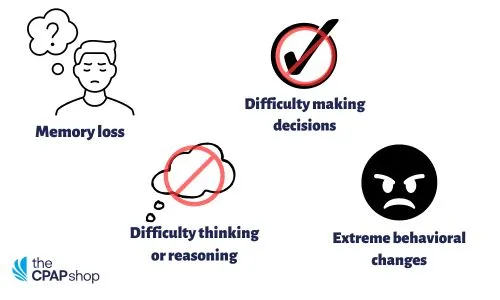
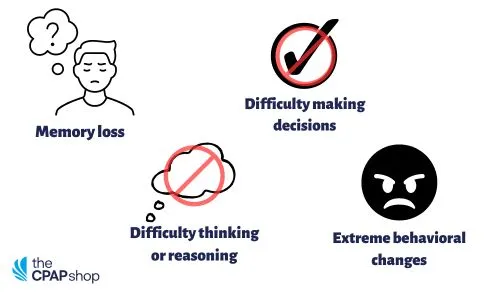
The symptoms of Alzheimer’s Disease can worsen over time, but it’s more beneficial to catch them in their earlier stages. Here are some signs and symptoms to be aware of:
- Memory Loss
-
Forgetting conversations, repeating questions and statements
-
Getting lost in familiar places
-
Forgetting names of closest friends and family
-
-
Difficulty thinking, reasoning, or multitasking
-
Difficulty making judgments and decisions
-
Behavior changes
- Feeling depressed, angry, or aggressive
- Losing interest in your social life or daily activities
- Abnormal breathing habits
How Does Alzheimer's Disease Affect Your Body?
Alzheimer’s can negatively affect your body in many ways. Since symptoms worsen over time, your mood, memory, social skills, and desire to do daily activities can take the biggest toll. This disease kills brain cells over time, and eventually even damages the cerebral cortex which is responsible for language, reasoning, and social behavior. It’s important to speak with a doctor to help treat some of the symptoms of this disease.
Does Sleep Apnea Affect Alzheimer's Disease?
Sleep apnea definitely can affect Alzheimer’s, and it is fairly common to have both health conditions. Sleep apnea increases the risk of getting Alzheimer’s and also worsens the symptoms. Sleeping challenges sleep apnea brings to someone can impact the overall progression and risk of Alzheimer’s, and those with sleep apnea can be diagnosed with Alzheimer’s much earlier in life than those who do not have sleep apnea.
Does Alzheimer's Disease Affect Sleep Apnea?
Having Alzheimer’s affects sleep apnea because this health condition interrupts typical sleeping patterns. The decline of brain function in a person with Alzheimer’s experiences interrupts the typical sleep cycles each night, which could cause sleep apnea. Sleep apnea occurs when a person repeatedly wakes up in the middle of the night due to several factors.
Link Between Alzheimer's And Sleep Apnea
Continuous positive airway pressure, or CPAP, has long been considered the gold standard for treating sleep apnea. CPAP therapy provides a constant flow of air pressure to an individual’s airway in order to keep it open throughout the night. This allows oxygen to flow to the patient’s brain and lungs, resulting in restful sleep. Continued use can even help alleviate the symptoms of sleep apnea.
In a 2015 study, researchers discovered that individuals suffering from sleep-disordered breathing (SDB) are more at risk for earlier onset of cognitive impairment and Alzheimer’s Disease. Researchers studied three groups without SDB and with untreated SDB and discovered that, on average, individuals with SDB developed cognitive impairment 10 years sooner than those without SDB.
In the same study, researchers used CPAP therapy to determine whether or not the onset of cognitive impairment could be delayed. In two of the three groups, CPAP was able to delay the onset of mental decline by an average of 10 years.
Summary of Sleep Apnea and Alzheimer's Study
While more research is needed, this study indicates a connection between disorders such as obstructive sleep apnea and Alzheimer’s. Can CPAP therapy delay cognitive impairment in those without disorders such as sleep apnea? The answer is still an open-ended one. However, individuals who think they may suffer from sleep-disordered breathing should take the necessary steps toward diagnosis and treatment. Untreated SDB can have a negative impact on not only your physical but also your mental well-being.
Where Can I Buy a CPAP Machine For Sleep Apnea and Alzheimer’s Treatment?
The CPAP Shop provides everything that sleeps apnea patients need to begin their CPAP therapy. From CPAP machines and CPAP masks to filters and mask liners – we have it all. If you have questions about your sleep therapy, contact us today. Our customer care team is available by calling 866-414-9700 today!




